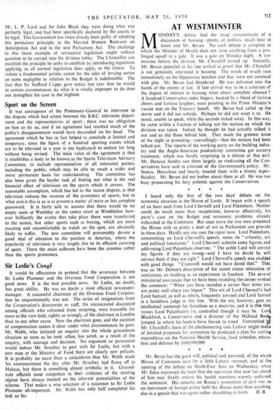AT WESTMINSTER
MONDAY'S debate had the usual concomitants of a discussion of housing.plenty of politics, much heat at times and Mr. Bevan. No such debate is complete in which the Minister of Health does not raise anything from a pro- longed squall to a gale. It was a gale on Monday night. A few minutes before the division Mr. Churchill turned up. Instantly, Mr. Bevan appealed to his late arrival as proof that Mr. Churchill is not genuinely interested in housing. The winds of wrath rose immediately on the Opposition benches and they were not unmixed with glee. Mr. Bevan had blundered He was delivered into the hands of the enemy at last. If late arrival was to be a criterion of the degree of interest in housing what about complete absence ? A hundred Conservative index' fingers, backed by a blend of furious cheers and furious laughter, were pointing to the Prime Minister's vacant seat on the Treasury bench. Mr. Bevan had called up the storm and it did not subside. Perhaps he did not want it to. He stood, unable to speak, while the seconds ticked away. In this way, he came within a fraction of talking out the motion on which the division was taken. Indeed, he thought he had actually talked it out and so did those behind him. They made the greatest noise of the night in protesting—unavailingly—that the motion had been talked out. The reports of the working party on the building indus- try and the Anglo-American productivity committee got cursory treatment, which was hardly surprising in a debate of this sort. Mr. Duncan Sandys saw them largely as vindicating all the Con- servatives have said in criticism of the Government's policy. Mr. Stokes, Herculean and hearty, treated them with a breezy super- ficiality. Mr. Bevan did not bother about them at all. He was too busy 'prosecuting his fiery polemic against the Conservatives.
• * I heard only the first of the two days' debate on the economic situation in the House of Lords. It began with a speech of an hour each from Lord Cherwell and Lord Pakenham. Neither could do much more than recapitulate, however effectively, his party's case on the Budget and economic problems already exhausted in the Commons But once more the two men presented the House with as pretty a duel of wit as Parliament can provide in these days. Hardly any one uses the rapier now. Lord Pakenham, commenting on Lord Cherwell's speech, notes its " urbanity, wit and political fanaticism." Lord Cherwell submits some figures and addressing Lord Pakenham observes: "The noble Lord will correct my figures if they are wrong—and I have no doubt he will correct them if they are right." Lord Cherwell's speech was studded with good things. " Cromwell would not have dared that." That was on Mr. Dalton's description of his recent minor relaxation of restrictions on building as an experiment in freedom. The several ministerial assurances that we have been rounding the corner evoked the comment: " When you have rounded a corner four times you are pretty well where you began." This wit of Lord Cherwell's had Lord Samuel, as well as others, frequently amused and Lord Samuel is a fastidious judge in this line. With the wit, however, goes an intellectual contempt for Socialism as a doctrine, and it is this that rouses Lord Pakenham's ire, controlled though it may be. Lord Blackford, a Conservative and a director of the Midland Ba jumped in where his leaders have feared to tread. Untroubled Mr. Churchill's fears of the electioneering uses Labour might ma s of detailed proposals for economies he produced a plan for cutting expenditure on the National Health Service, food subsidies, educa- tion and defence by £600,000,000. * * * * Mr. Bevin has the good will, political and personal, of the whole House of Commons save for a little Labour remnant, and at the opening of the debate on South-East Asia on Wednesday, when Mr. Eden expressed the hope that the operation that now lies ahead of him may finally restore his health members warmly endorsed the sentiment. His remarks on Russia's promotion of civil war as an instrument of foreign policy held the House more than anything else in a speech that was again rather shambling in form. H. B.






































 Previous page
Previous page